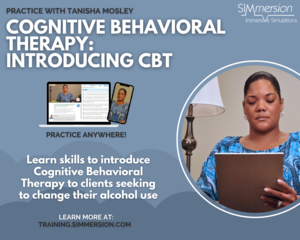Cognitive Behavioral Therapy: Introducing CBT with Tanisha Mosley
Scenario
Tanisha Mosley is new to therapy and is looking for ways to cut back on her drinking and reduce her stress. Work together with Tanisha and show how Cognitive Behavioral Therapy can be used to help change her drinking habits.
Cognitive Behavioral Therapy (CBT) is one of the most used and extensively studied treatments for alcohol use disorders (SUDs). CBT helps people understand and change their emotions and behaviors related to their substance use. Understanding how to apply these skills for a client's individual needs can make a great impact on the client's success.
Users
Social Work,
Healthcare & Students
Recommended Plays
3 - 5 minimum
Average Time
per Session
15 - 30
minutes
Teaching Objectives:
- Discussing Topics for Introducing CBT
- Developing a Positive and Collaborative Relationship
- Utilizing Core CBT Concepts to Structure the Conversation
Included in Training:
- A Training Guide with information on best practices for introducing CBT as a treatment for a new client.
- A Simulated Conversation with a varied character to prepare learners for questions and pushback from clients with different levels of willingness to use CBT.
- Comprehensive Feedback during and after each play to help guide skill development.
This training was developed in collaboration with Binghamton University, Brown University, & Yale School of Medicine.
This training can be purchased as a part of the Cognitive Behavioral Therapy Training Suite. Please visit CBT Suite for more information.Research
Mastroleo, N., Humm, L., Williams, C., Kiluk, B., Hoadley, A., & Magill, M. (2020). Initial testing of a computer-based simulation training module to support clinicians' acquisition of CBT skills for substance use disorder treatment. Journal Of Substance Abuse Treatment, 114, 108014. doi: 10.1016/j.jsat.2020.108014. Read More
Smith, M. J., Bornheimer, L. A., Li, J., Blajeski, S., Hiltz, B., Fisher, D. J., Check, K., & Ruffolo, M. (2020). Computerized clinical training simulations with virtual clients abusing alcohol: Initial feasibility, acceptability, and effectiveness. Clinical Social Work Journal. Read More


